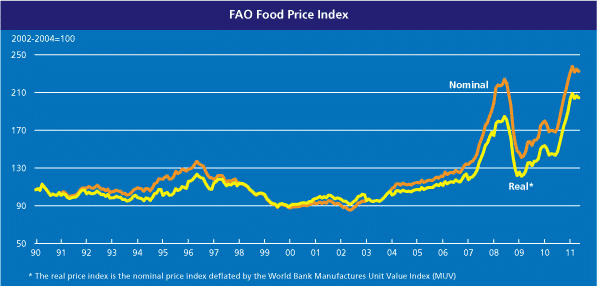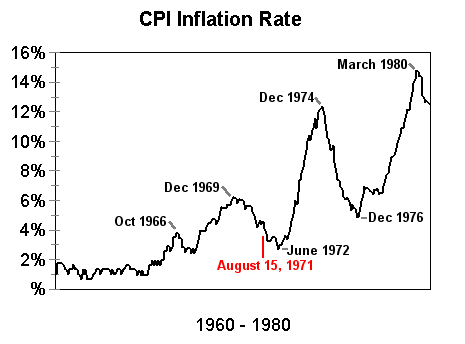With food prices at historic highs, politicians are scrambling for something to blame other than themselves. That was the main agenda item on the meeting of the G-20 finance ministers from the 20 biggest economies in the world.
 Chinese farmers rescue their pigs in flood waters (AFP)
Chinese farmers rescue their pigs in flood waters (AFP)
The meeting, which ended on Thursday, published an Action Plan with the following five main objectives:
- improve agricultural production…;
- increase market information and transparency … ;
- strengthen international policy coordination in order to enhance confidence in international markets and to prevent and respond to food market crises more efficiently;
- improve and develop risk management tools for governments … ;
- improve the functioning of agricultural commodities’ derivatives markets … ;
Among the actions proposed by the plan, “we will give special attention to smallholders, especially women and young farmers, in particular in developing countries.”
I wanted to quote some of the Action Plan so that it would be apparent how vacuous the whole thing is. I don’t know how many millions of dollars of taxpayer money was spent on this meeting, but it can’t have been worth the money.
French President Nicolas Sarkozy wanted to blame the rise in food prices on speculators, according to Bloomberg, and demand regulation of the financial commodities markets, but he was unable to get agreement. Presumably speculators weren’t the cause of the massive floods in China that are drowning farmland, as shown in the picture above.
The only interesting bit of controversy came over the the question of studying restrictions on biofuels to control food prices, but that was rejected as well, according to the Financial Times (Access).
The collapse of the Green Revolution
The political posturing at G20 came just a week after the release of a new report by the UN’s Food and Agriculture Organization (FAO), which states as clearly as anyone has that the Green Revolution is now failing more and more, and that a completely new and completely different New Green Revolution is required.
“The Green Revolution in agriculture, which swept much of the developing world during the 1960s, saved an estimated one billion people from famine. Thanks to high-yielding crop varieties, irrigation, agrochemicals and modern management techniques, farmers in developing countries increased food production from 800 million tonnes to more than 2.2 billion tonnes between 1961 and 2000. Intensive crop production helped to reduce the number of undernourished, drive rural development and prevent the destruction of natural ecosystems to make way for extensive farming. Those achievements came at a cost. In many countries, decades of intensive cropping have degraded fertile land and depleted groundwater, provoked pest upsurges, eroded biodiversity, and polluted air, soil and water. … [T]he yield growth rate of major cereals is declining, and farmers face a series of unprecedented, intersecting challenges: increasing competition for land and water, rising fuel and fertilizer prices, and the impact of climate change. …
It is now recognized that those enormous gains in agricultural production and productivity were often accompanied by negative effects on agriculture’s natural resource base, so serious that they jeopardize its productive potential in the future. “Negative externalities” of intensification include land degradation, salinization of irrigated areas, over-extraction of groundwater, the buildup of pest resistance and the erosion of biodiversity. Agriculture has also damaged the wider environment through, for example, deforestation, the emission of greenhouse gases and nitrate pollution of water bodies.”
In other words, the Law of Diminishing Returns is working its magic with the use of fertilizers and insecticides, so that they’re less effective as time goes on, and in fact they’re causing actual damage to farmland. Other resources, including groundwater and forests, are being used up.
As I’ve described in the past, the Green Revolution petered out in the 1990s, at the same time that the financial crises began, and for the same reasons — the disappearance by death and retirement of the generations of survivors of the Great Depression and WW II. The result has been sharply rising food prices since the year 2000:
 Food Price Index, June 2011 (FAO)
Food Price Index, June 2011 (FAO)
From the point of view of Generational Dynamics, we can expect a New Green Revolution to take hold in the 2020s, after the Clash of Civilizations world war has ended, just as there was a Green Revolution after WW II ended.
Unintended consequences of health care law
A related story is the recent survey of employers commissioned by McKinsey & Company that 30 percent of surveyed employers were “definitely or probably” planning on discontinuing employer-sponsored health insurance after 2014, when the new health care law comes into effect.
As I’ve written several times in the last two years, the so-called “Obamacare” law is economic insanity, and has no chance of actually being implemented.
|
|
 |
|
|
Until 2009, by far the dumbest and most destructive economic policy enacted in Washington in my lifetime was the imposition, by President Richard Nixon’s administration, of wage-price controls, to counter the national “emergency” represented by an inflation rate of about 4.5%. The controls program was an utter disaster. The inflation rate spiked up during the period of wage-price controls, as you can see from the graph. It caused numerous shortages and mini-calamities, did enormous damage until it was ended three years later, and required years for the economy to recover from the damage.
One story that’s always stuck in my mind was that farmers in New Jersey were drowning chickens. The problem was that chicken feed was a commodity whose price was determined by the international commodities markets, and so its price could not be controlled, while the prices of chickens WERE controlled. So the prices of chicken feed went up, and the prices of chickens stayed the same, meaning that farmers could no longer afford to raise chickens. So they drowned the chickens, leading to a big shortage of chickens. There were thousands of stories like that.
The new health-care law is a repeat of Richard Nixon’s wage-price controls as applied to health care industry, and the result is equally disastrous. We have stories of worsening doctor shortages, waivers being granted to political cronies, and lawsuits by people who aren’t political cronies. It’s an absolute mess.
The government cannot control health care prices any more than it can control food prices. The G-20 meeting was a waste of time, but the ministers didn’t jump off a cliff by imposing food-price controls. The McKinsey study is just the lastest reason why the health care law is economic insanity, and why it will never be implemented.
COMMENTS
Please let us know if you're having issues with commenting.